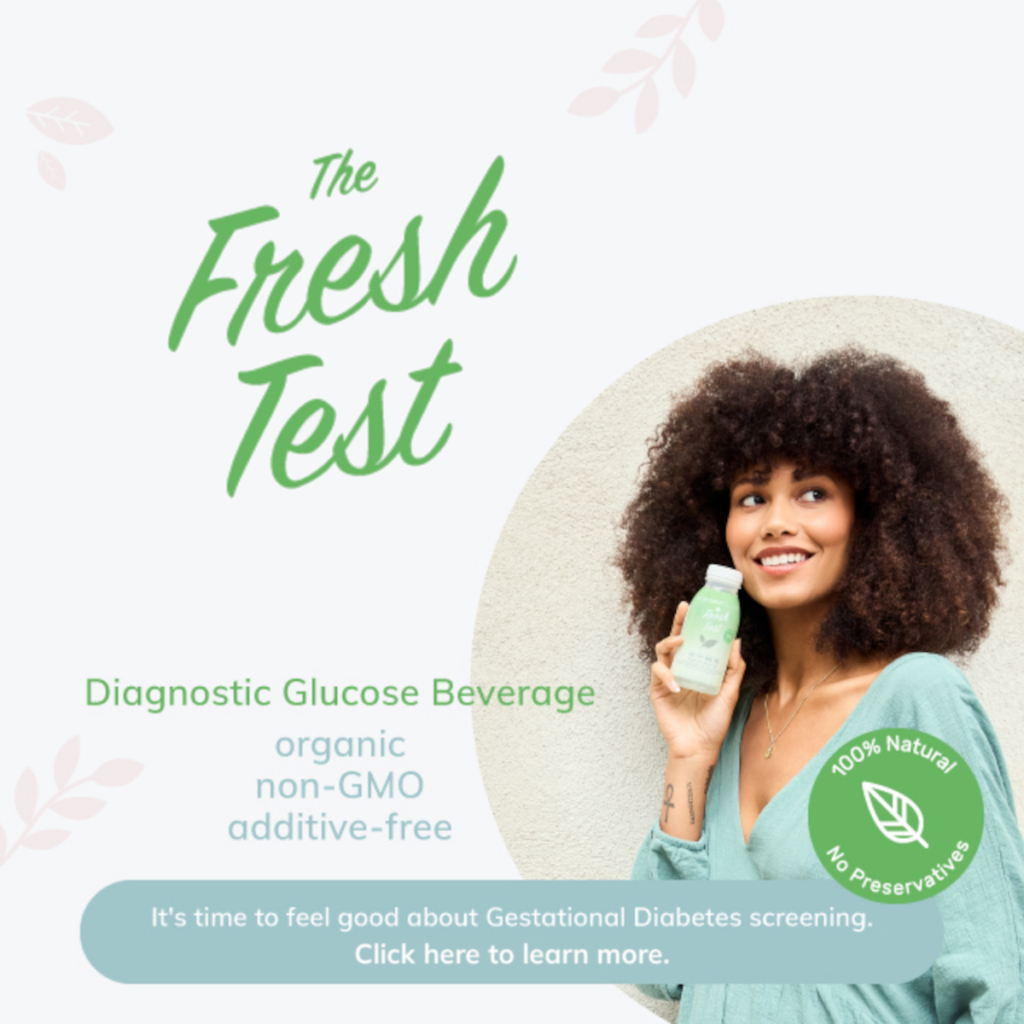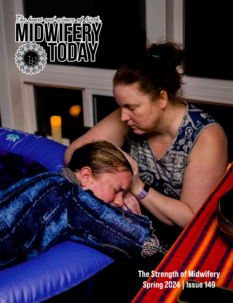
Birth Healing
Editor’s note: This article first appeared in Midwifery Today, Issue 83, Autumn 2007.
Subscribe to Midwifery Today Magazine
Editor’s Note: Rosetta lost her mother when she was born, as a result of an epidural. She shares here how birthing her own daughter helped her on the road to healing.
 A common myth in our culture is that medicalized birth is safest for mother and baby. This is not always true.
A common myth in our culture is that medicalized birth is safest for mother and baby. This is not always true.
In 1975, my mother died giving birth to me in a small California town. The story, according to my grandmother, is that I was past due. My mother’s doctor was about to leave for vacation and recommended induction. My mother very much wanted a baby; she wanted nothing more than to be a mother. She had two stillbirths before me: Michelle and Christine are the older sisters I never got the chance to meet face-to-face.
After waiting many years and through three full-term pregnancies, my mother was ready for her baby. My father told me that as she was receiving an epidural during her labor, she said that something didn’t feel right. The doctor continued administering the epidural. No one really knows what happened after that moment, except that she lost her life. The story told is that I was born dead. The doctors were able to revive me, but not my mother. I will never know how she died or how I was born. The only signs of what happened were large bruises on my head from forceps and a huge empty space in my heart.
My father named me Rosetta Frances Russo, a name worthy of an Italian princess, and also my mother’s name. As a child, I knew that something was different about me. I was special yet abnormal all at the same time, the “single child without a mother.” Feeling the pity and sadness that my arrival had brought to others became commonplace. My family seemed afraid to talk about her and I was afraid to ask, as if speaking about her was against the rules. Each birthday brought cake, gifts, laughter and solitary moments of sorrow and guilt with the passing of each year. I truly began to mourn when I entered adulthood.
My husband and I decided to have a baby when I was twenty-seven years old, the same age that my mother was when she died. I loved being pregnant. I loved having special bathroom privileges, wearing maternity clothes that accentuated the roundness of my belly, and I especially loved feeling and watching the dancing and fluttering movements within me. As much as I enjoyed pregnancy, I could not allow myself to forget that I would one day have to give birth and I was horrified by this thought. I was afraid not only of the pain of birth; I was even more afraid of pain medication. Birth was not only frightening, it was fatal. In my immediate family, three out of five people had died during birth, my mother and my two sisters. To me birth meant death more than it meant life. A routine epidural had kept me from having the chance to look into my mother’s eyes, from knowing the sound of her voice.
I did a lot of reading, and a great deal of preparation. I chose to have a midwife and a waterbirth in the hospital birth center. I didn’t know what the future held, except that a person was definitely growing inside of me and one way or another it would have to come out.
Five days before my due date, on a Sunday, I felt the urge to go to bed particularly early. I was awakened at 2:00 am by a contraction. Every 15 minutes another one came, all through the night. As hard as I tried, I couldn’t go back to sleep; I was too busy timing contractions. The contractions continued throughout the next day as my husband, my mother-in-law, my dog, my belly and I talked, walked and picked chestnuts from a tree down the street.
 That night we went to the hospital. I was sure that after 16 hours of regular contractions this baby was ready to come out. When the nurse checked me, I was dilated to 3 cm. That was only 1 cm more than I had been four days before. I felt more than discouraged.
That night we went to the hospital. I was sure that after 16 hours of regular contractions this baby was ready to come out. When the nurse checked me, I was dilated to 3 cm. That was only 1 cm more than I had been four days before. I felt more than discouraged.
The next few hours of my labor were difficult to remember. I don’t know how much time had passed, but I do remember reaching 6 cm. At that point I graduated to being able to get into the water, my savior. The energy in the room lightened as my birth tub was set up in the hospital birthing suite. The sound of the water, the heat, the weightlessness, the gushes against my skin and the relaxation brought me back to the real world for a brief moment. I was able to think about what I had just been through, and already I couldn’t imagine the intensity that I had just experienced only moments before, let alone what was still to come.
After I got out of the tub, my labor continued to progress for several more hours, until I got to 9½ cm. Transition came and kept coming and coming. My midwife broke my bag of waters to try to encourage my cervix to open completely, and then more time passed. I began to experience intense pain and started to feel panicky. I don’t know how much time had gone by—maybe two hours, maybe more—yet I still remained at 9½ centimeters. I made a desperate plea for help, as I grunted and groaned. Unbearable pain continued to fill me as my baby’s head put more and more pressure on my cervical lip.
I again got into the tub where my midwife held the lip of my cervix open as I began to push. My baby slowly moved down my birth canal. I could feel the features of her face as she traveled through me. I especially remember the pressure of her little arm, which she was holding up over her head like a super hero. I heard my midwife tell me to “push into the pain.” I didn’t know what this meant until I felt it. I felt that “ring of fire” I had been told about. I heard a high-pitched shriek that must have come from me. I pushed into each contraction, again and again and again.
I pushed for two hours. I blacked out between contractions, awakening to a new burst of energy and new noises bellowing out of my mouth. By the time my daughter was about to arrive, I thought that labor was my life. My entire world for twenty-six hours had consisted of nothing more than waiting for the next contraction. All of a sudden, the nurses began to get really busy in the room. They started pulling things out of cabinets, and I noticed a baby crib roll by.
My midwife said to me, “Okay, Rosetta, I want this one to be really strong and slow.” I didn’t know that that was the push until I heard her say, “Here is your baby.” Out of the water emerged something that nothing could ever have prepared me for until that. In my arms, I embraced a person with a life all its own, which I had just brought into the world.
My daughter Francesca was born at 3:43 am under a full moon on a beautiful October night three days before her due date. She weighed 7 lb 14 oz. We welcomed her to the world, my husband cut the cord and we all got out of the tub. Francesca was brought to a crib to have her vital signs checked while I went to the bed to deliver the placenta.
Lots of people were in the room making lots of commotion. My midwife suddenly became stern, like a sergeant calling her troops to attention. Everyone in the room seemed to immediately focus their attention between my legs with expressions of shock and worry. Nurses poked an IV into me while my midwife inserted her hand between my legs. Her arm seemed to disappear up to her elbow. I wasn’t sure what was happening, but adrenaline kept me alert and attentive to the baby crib next to my bed. My husband turned around holding a neat little bundle. His face was wet, and he was working hard to hold in large sobs as he said, “She’s perfect. She has a full head of hair.”
No one in the room used the word “hemorrhage” following the birth of my daughter. No one spoke of the blood that was pouring out of me, until days later. But I knew at the time that none of that mattered. I watched my husband holding our daughter, her beautiful tiny face so full of wisdom and grace. She was licking her bright red lips to feel the air with her little tongue, while the rest of her body was confined in the nurse’s tight swaddle. She was my daughter; I was her mother. I realized that if I didn’t survive the next moments, the only thing of importance to me was that my daughter was all right.
With Pitocin and time, the bleeding eventually stopped. My baby was handed to me and took only a moment to decide that nursing was the perfect job for her. About an hour later, a nurse asked if I would like to take a shower. The thought was overwhelming, but seemed like a good idea. The nurse helped me walk across the room to the bathroom. As I stepped into the shower, I noticed the trail of blood behind me. The nurse had me sit in a chair in the shower. As the water poured over me, the bottom of the tub quickly filled with red. Dark, vibrant, almost glowing swirls of red. The stream of blood continued gushing from between my legs for several minutes, as I sat weak and helpless. I remember feeling complete admiration for this woman who carefully and affectionately cleansed me in preparation to reunite me with my baby.
After my shower, I crawled into bed clean and renewed. A bundle was handed to me like no gift that I had ever before received. She was sleeping, peaceful. I placed her on my left side and watched her. I stared in amazement through the rest of that incredible night and into the next day. I tried to close my eyes to sleep, but didn’t want to miss one moment or one new expression on her face. I was overcome with love and gratitude at the reality of holding her precious little body in my arms. I was so proud of her, and of me, and of the fact that we did it. I gave birth to a child, and we both survived.
Soon after my daughter’s birth, I realized that I wanted to support women through their birth experiences as I had been helped. Our community has changed drastically since then, so the option of having a waterbirth in the hospital where I had my daughter no longer exists. The midwifery practice that I chose has since closed. My nurse-midwife was forced into early retirement after delivering babies in our community for over 20 years. This news devastated me, because without my skilled and compassionate midwife, without my womb-like birthing tub, I may have been one more statistic—one more induction, one more epidural, one more cesarean.
My daughter’s birth had allowed me to gain some of my life back. Now all of the gifts that I had available to me are no longer options for other women and babies in our community.
I decided to get more involved in our local birth community and began learning to be a doula. I chose to put my experiences and losses into action and work toward helping families to create their own safe and healthy birth experiences.
I have since opened a natural family herbal shop and mother/baby resource center. I am a doula as well as an herbal practitioner, specializing in the needs of pregnancy, birth, postpartum, breastfeeding and infant care. I am thankful every day to have the opportunity to work with families as they approach and enter parenthood. I am constantly reminded when holding my daughter in my arms, hearing her innocent laughter and watching her face light up as she learns something new, that motherhood is a miracle. I will always be committed to supporting informed birth choices, to allowing families the space to trust birth and to reminding mamas how incredible they are. As the cycle of life continues, one breath at a time, I will always feel blessed and cleansed by the sacrifice and phenomenon of new life.
Last spring, one of my dearest friends became pregnant. When the time came for her baby to arrive, another friend and I remained with her in the hospital throughout her labor. Together we massaged and breathed, all three of us moaning a primal birth song with each contraction, rhythmic with the sound of the baby’s heartbeat coming from the monitor. She had wished for a natural birth, but things had not gone as planned and she had been given Pitocin. Her labor became incredibly intense, and she asked the nurse to explain the risks of an epidural. She made the comment, “I don’t want to die.”
The nurse responded, “Women don’t die from epidurals.”
I held my friend’s hand as the anesthesiologist put the needle into her spine. I tried to set all thoughts of my mother aside as I looked in her eyes and told her how much she was loved. About 30 minutes later, the anesthesiologist said that the needle had hit a blood vessel and that he would have to do it again. My anxiety returned as the doctor took out the original epidural and placed it a second time, while we all waited for relief to come.
By the time the epidural was in effect, the baby was on her way. My beloved friend pushed beautifully, and soon the baby came. Because of the presence of meconium, the neonatal team took the baby immediately. My job was to go with the baby, my godchild. She was 5 lb 12 oz, a tiny unknowing bundle, and the doctors worked hard to get her to breathe. This little wonder remained motionless on the table. Five minutes went by, and she still struggled. As the minutes passed, tears welled up in my eyes. As I talked to her, telling her how happy we all were to see her and how much she was loved, I could feel pressure in my chest and throat that I fought to keep inside. This little baby deserved to be greeted into the world by snuggling on her Mama’s chest and instead she was on a table, under bright lights, fighting for her life. I saw myself in this beautiful child. Finally, she began to coo and breathe on her own. She was wrapped up and given to her mother, where she latched on almost immediately in pure bliss. She received what I wasn’t able to as a baby, the warm and loving arms of her mother. They were both content and perfect, and through them I felt myself heal.


















